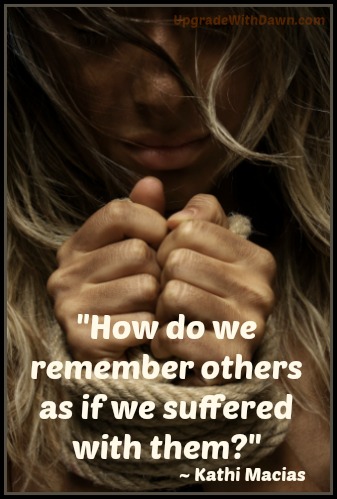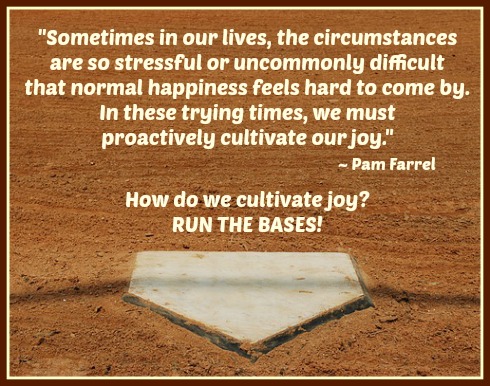As if Chained with Them
Kathi Macias' novels about issues like human traficking, survival in non-Christian surroundings and persecution of Christ-followers have challenged me greatly and encouraged my desire to pray for the  persecuted Church. In this Biblical Thinking UPGRADE, she encourages us to consider the persecuted in a more impassioned and involved way.
persecuted Church. In this Biblical Thinking UPGRADE, she encourages us to consider the persecuted in a more impassioned and involved way.
"The Bible tells us to remember the prisoners—those who suffer for their faith—'as if chained with them,'" Kathi says. "This is more than a call to remember our persecuted brothers and sisters in prayer; and it is also a call to do whatever we can to ease their suffering and strengthen their witness."
Many years ago in college, I (Dawn) was first moved to pray for the Persecuted Church in Russia. I felt their struggle and cried out to God in their behalf. It's a burden that's never left me, and I'm glad to see Kathi opening her heart about it today.
Kathi continues . . .
As a new believer in 1974, I came to view the Church through an "American lens," as if every Christian around the world lived and worshipped in much the same setting and circumstances as I did.
However, after hearing a few guest missionaries speak at our church's evening services, my understanding of the plight of many believers in other countries changed drastically.
In addition, my Bible reading regarding the early Church took on new meaning. I realized it wasn't just first-century Christians who suffered persecution; it was also believers around the world today who suffer unimaginable hardships for no reason other than their faith in Christ.
It was during that time that I read the third chapter of Hebrews—not for the first time since becoming a believer, but for the first time since my eyes were opened to the plight of fellow believers. Verse 13 nearly jumped off the page as I read it over several times:
“Remember the prisoners as if chained with them—those who are mistreated—since you yourselves are in the body also” (NKJV).
Now I have since heard that scripture used in prison ministry, and I don’t discount that, as I too have served in jail and prison ministries through the years and have quoted that verse more than once in that setting.
However, it is obvious from a clear reading of this verse that the author is referring to believers, those who, like us, “are in the body also.” It is also clear that we are to “remember” these prisoners as if we, too, were “chained with them.” What does that mean?
How do we remember others as if we suffered with them?
1. Of course, we must “remember” to pray for them as if we were praying for ourselves (or a loved one) in such dire straits.
I know that if I were the one in chains, I would be in constant prayer and communion with God about every aspect of my situation. And if one of my grown children or grandchildren were being held in such circumstances, that remembrance would no doubt be my last anguished thought as I drifted off to sleep at night, and the first thought when I awoke the next morning.
I would need no reminding or prodding to pray for them; it would flow naturally and regularly from my broken heart.
And that is the type of ongoing, heartfelt prayer God calls us to in Hebrews.
But is prayer enough—even regular, anguished prayer? It is, of course, the first and most important thing we can do for our suffering brothers and sisters in Christ, but can we take it to the next step?
Is there something we can do beyond lifting those “in chains” to God, the only One who can help them?
I believe there is—and I believe we must.
2. Do what you can to ease their suffering.
If, as the verse declares, we are to “remember” our persecuted brothers and sisters in Christ “as if chained with them,” then we need to do for them what we would want others to do for us if we or our family members were the ones in chains. We would want them to pray and also to do what they could to help ease our suffering.
As a result of coming to understand that, I have personally become involved with several worldwide ministries, including Voice of the Martyrs who work tirelessly to assist persecuted believers around the world.
Not only do I receive email updates from them with information on how to pray for certain people, but I also receive their monthly magazine, containing inspirational stories of believers who have stood strong under persecution and seen God’s faithfulness in the middle of it.
Gratitude for prayer is a hallmark of their victorious testimonies.
They also express their appreciation for help received, such as food or clothing or other material assistance.
One of my greatest joys is to know that I help monthly by financially supporting someone who trusts God and goes out to minister in some of the most dangerous places imaginable.
In addition to Voice of the Martyrs, other ministries (i.e., Open Doors, Compassion International) offer opportunities to “remember” those who suffer “as if chained with them.” Working with such ministries is a way for all believers to participate in answering that call.
Not only does such ministry involvement bless and encourage others around the world, it deepens our relationship with the One who calls us to do so.
Are you praying for the Persecuted Church? If not, ask God to move your heart to do so. What ministry to those "in chains" of persecution might you consider today to help you cultivate a heart of compassion for brothers and sisters in dangerous places?
Kathi Macias is a multi-award winning writer who has authored nearly 60 books and ghostwritten  several others. Kathi won the 2008 Member of the Year award from AWSA (Advanced Writers and Speakers Association) and was the 2011 Author of the
several others. Kathi won the 2008 Member of the Year award from AWSA (Advanced Writers and Speakers Association) and was the 2011 Author of the  Year from BooksandAuthors.net. Her novel Red Ink won the 2011 Golden Scrolls Novel of the Year Award and was also a finalist for a Carol Award from American Christian Fiction Writers. Kathi “Easy Writer” Macias lives in Homeland, CA, with her husband, Al. You can learn more about her and her books/ministry at www.kathimacias.com.
Year from BooksandAuthors.net. Her novel Red Ink won the 2011 Golden Scrolls Novel of the Year Award and was also a finalist for a Carol Award from American Christian Fiction Writers. Kathi “Easy Writer” Macias lives in Homeland, CA, with her husband, Al. You can learn more about her and her books/ministry at www.kathimacias.com.
Graphic adapted, courtesy of Engin Akyurt at Unsplash.
 1 Comment → Posted on
1 Comment → Posted on  Tuesday, July 7, 2020 at 10:11AM
Tuesday, July 7, 2020 at 10:11AM  Kathi Macias,
Kathi Macias,  Persecuted Church,
Persecuted Church,  Persecution,
Persecution,  Persecution of Christians,
Persecution of Christians,  Prayer,
Prayer,  Upgrade with Dawn,
Upgrade with Dawn,  Voice of the Martyrs Upgrade Your Life
Voice of the Martyrs Upgrade Your Life  Activism,
Activism,  Biblical Thinking,
Biblical Thinking,  Prayer,
Prayer,  Spiritual Growth
Spiritual Growth 

















